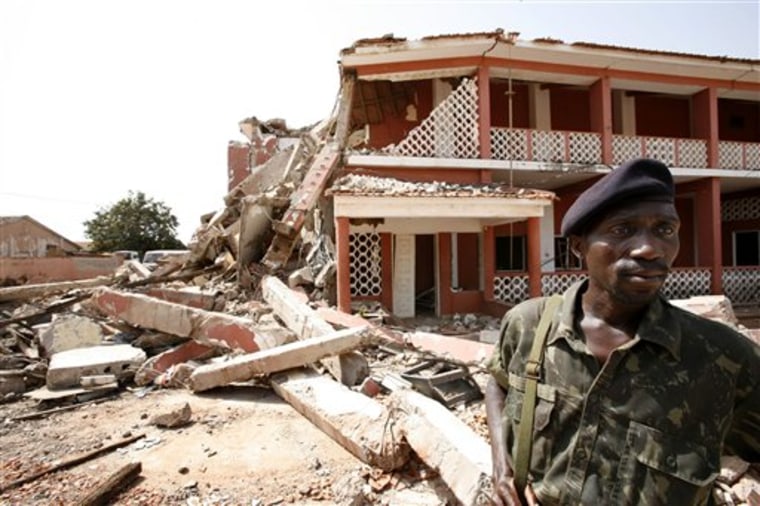The head of Guinea-Bissau's parliament took the oath of office as president Tuesday, a day after the man who ruled this tiny, coup-prone West African nation for 22 years was gunned down in front of his wife inside their villa.
A hush fell over the parliament chamber as delegates stood, solemnly observing a moment of silence for President Joao Bernardo "Nino" Vieira and his long-standing rival, the head of the armed forces.
The two were assassinated in back-to-back attacks beginning Sunday night, when a bomb hidden underneath a staircase killed the army chief inside his office. His inner circle pointed the finger at Vieira and hours later, the president was assassinated.
On Tuesday, Head of Parliament Raimundo Pereira became the country's new president, although the constitution calls for elections to be organized within two months. Earlier in the day, Pereira had addressed parliament and said that Guinea-Bissau "is facing a very delicate situation."
In his comments, he called on the other delegates "to assume their responsibility toward the nation" in ensuring calm and the rule of law in the former Portuguese colony, which is struggling to stem a booming cocaine trade.
The military has blamed an "isolated group" of soldiers for the president's assassination Monday. A statement issued by the military denied that the assassination was retribution for the killing one day earlier of Vieira's longtime rival, armed forces chief of staff Gen. Batiste Tagme na Waie.
'A tragedy for Africa'
Cheikh Tidiane Gadio, a member of a fact-finding mission sent by ECOWAS, a regional bloc of 15 African states, said late Tuesday that the twin assassinations have ramifications for the continent.
"We took it as a tragedy for Africa as a whole because once again the rest of the world is watching us and making judgments," said Gadio, who is Senegal's minister of foreign affairs.
He said ECOWAS was focused on finding answers. "We need to know what happened to President Vieira and what happened to the armed forces' chief of staff," he said.
Vieira's home, a modest bungalow in the capital, had a rocket hole in its door. Several cars parked outside were riddled with bullet holes. Gadio said the ECOWAS delegation met with Vieira's widow and learned from her that her husband had essentially been executed before her eyes.
Guinea-Bissau has suffered multiple coups and attempted coups since 1980 when Vieira himself took power in one. He was forced out 19 years later at the onset of the country's civil war, later returning from exile in Portugal to run in the country's 2005 election and win the vote.
A member of the minority Papel ethnic group, Vieira was in many ways an outsider. He always had a tense relationship with the army, which like the country is made up primarily of officers from the majority Balanta ethnic group.
In the 1980s, after renegade soldiers attempted a coup against him, Vieira went after the top Balanta officers, systematically purging them in military tribunals that condemned them to death.
Waie was one of the Balanta soldiers accused of plotting the coup and although he was not killed, he was dropped off on a deserted island off the coast of the country and left there for years before being allowed to come back.
Booming drug trade
Vieira's death creates a dangerous opening in light of the country's appeal to cocaine smugglers.
While demand for cocaine has leveled off in the U.S., it continues to rise in Europe, forcing Latin American drug cartels to aggressively seek new routes to smuggle cocaine to Europe. In recent years, they have begun flying small, twin-engine planes to Africa's West coast, where they land on deserted islands or on dirt runways and then parcel out the drugs to dozens of smugglers who ferry them north.
Guinea-Bissau, ringed by an archipelago of uninhabited islands, has become a key transit point for Europe-bound cocaine, with the government estimating that as much as 1,750 pounds of the drug is transiting the country's borders each week. It's an amount worth billions of dollars per year, dwarfing all other economic sectors.
It's unclear how the assassinations of the two powerful figures will affect the drug trade. Many have long suspected that the army chief and the president were complicit in the trade. Others — including the U.N. drug czar for the region — have argued that they were powerless to stop them.
"Drug traffickers do need partners to serve their interest and reduce the risk generated by this situation," said Antonio Mazzitelli, the West Africa director of the U.N. Office of Drugs and Crime. "Both President Vieira and Gen. Tagme were very vocal against the infiltration of narcotraffickers in the country — but also powerless against their financial power of corruption."
Contract job?
While the twin assassinations do not appear to be drug-related, analysts point out that the use of a bomb to kill Waie is highly unusual in West Africa, where assassinations and coups d'etat are still the domain of the Kalashnikov.
"For the first time, a bomb was used, which looks really and truly not African — that's the not the way such actions are put together (here in Africa)," said Gadio of the ECOWAS delegation.
The use of the bomb could indicate that the assassination was a contract job, led by foreigners. It's led some to point the finger at the Colombian drug cartels. Car bombs are common occurrences in Colombia — unlike in West Africa.
More on:
